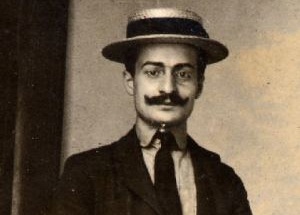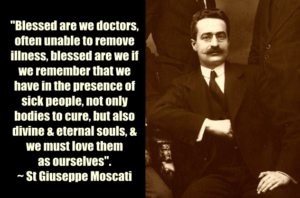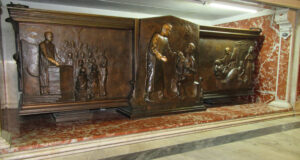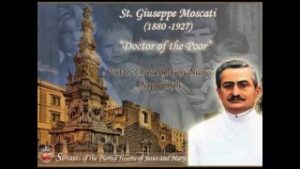
St. Joseph Moscati was a brilliant physician and researcher and was known as “The Holy Physician of Naples”. Giuseppe (Joseph in English) Moscati, the seventh of nine children, was born in 1880 to Francesco Moscati and his wife, Rosa De Luca dei Marchesi di Roseto. The family lived at Benevento in the hills of southern Italy, and Francesco moved the family in 1884 to Naples, where he was a prominent lawyer and judge. Joseph received his first Communion at age eight and Confirmation at age ten. Francesco was the strong spiritual leader of his family, and it appeared that young Joseph was going to grow up to be the same way.
DISCOVERY OF VOCATION
Many people expected young Joseph to follow in the footsteps of his father into the law profession. However, when Joseph was twelve, something caused a change in his field of interest. His older brother Alberto, while serving in the cavalry, fell from his horse and experienced a severe head injury. Alberto was bedridden during his long convalescence, and Joseph spent a lot of time at his bedside. Observing how ineffective Alberto’s treatment was in the effort to restore him to health, Joseph resolved to study medicine. He graduated from school in 1897 and his father died that same year. He enrolled in medical school at the University of Naples, which was a bastion of anti-Catholic secularism. He never abandoned his faith, however, and kept his focus firmly on his faith and his studies. He earned his medical degree in 1903 with honors, and his thesis covered the topic of hepatic urogenesis, having to do with pancreas, liver, and kidney function.
DEDICATION TO RELIEVE SUFFERING
After graduation, Dr. Moscati joined the staff at the Hospital For Incurables in Naples, and he continued his research during his free time, especially in what was a new subject at the time, biochemistry. He also taught classes at the University’s medical school. He possessed an impressive ability to correctly diagnose diseases, and he became an administrator at the hospital. He decided to remain celibate in order to be able to devote all of his time and energy to his patients, his students, and his studies. He prayed the rosary and attended Mass daily. In April of 1906, nearby Mount Vesuvius erupted, endangering a nursing home filled with elderly, infirm, and paralyzed residents. Dr. Moscati directed the evacuation process, personally transporting many of the patients just moments before the roof fell in. He spent many of his morning hours holding free clinics in impoverished neighborhoods, and established programs for helping slum dwellers with basic life and health skills to raise themselves above their deplorable living conditions. He gained such a reputation for his brilliance and his charity, he was regularly surrounded by a large cluster of interns who followed him during his hospital rounds. He continued his studies in many different medical subjects in order to be better able to meet the needs of his patients. He was awarded a chair at the medical school in 1908. In 1911, when a cholera outbreak occurred in the area, he conducted research on the disease’s causes and treatments, and he also examined public facilities to prevent the spread of the infection.

When Dr. Moscati’s mother died in 1914 from diabetes, he devoted himself to experiments with insulin. During World War I, he tried to join the armed forces but was refused because he was more needed for the treatment of wounded soldiers. He treated approximately three thousand soldiers at his hospital. On April 12, 1927, he attended Mass, did his usual hospital rounds, ate his lunch, and, feeling tired, sat for a while in his home office chair. He died there peacefully, most likely of a stroke, at just forty-six years of age. His remains are interred at the beautiful Church of Gesù Nuovo in Naples.

BELOVED DOCTOR OF NAPLES
St. Joseph Moscati was a man of great devotion, especially considering how he kept a very full schedule of work, study, teaching, and charity. A brilliant researcher, he authored thirty-two academic papers. He treated impoverished patients without charge, and was known to send patients home with an envelope of cash for medications. Not only did he pray for his patients, he prayed with them, and recommended reception of the Sacraments to those facing surgery. He understood the strong influence of religious faith in the healing process. The case of miraculous healing for his canonization involved a young man dying of leukemia who was cured and attended the canonization in 1987. A movie about his life, St. Giuseppe Moscati: Doctor to the Poor was made in 2007 and faithfully presents the life he lived. Usually known as The Holy Physician of Naples, he is especially remembered on his November 16 feast day.

